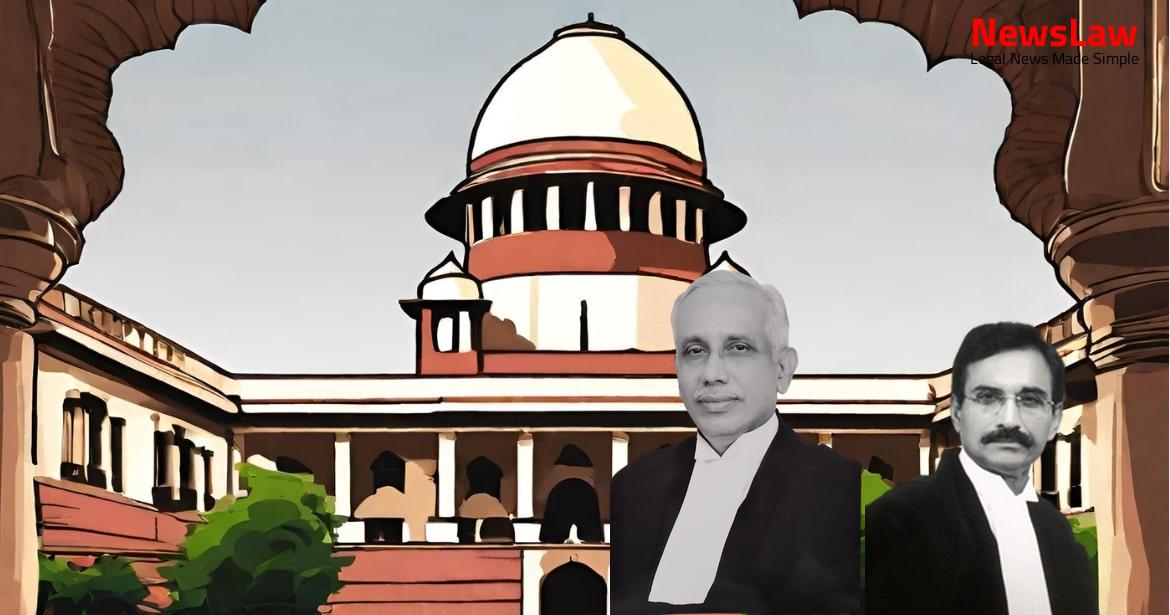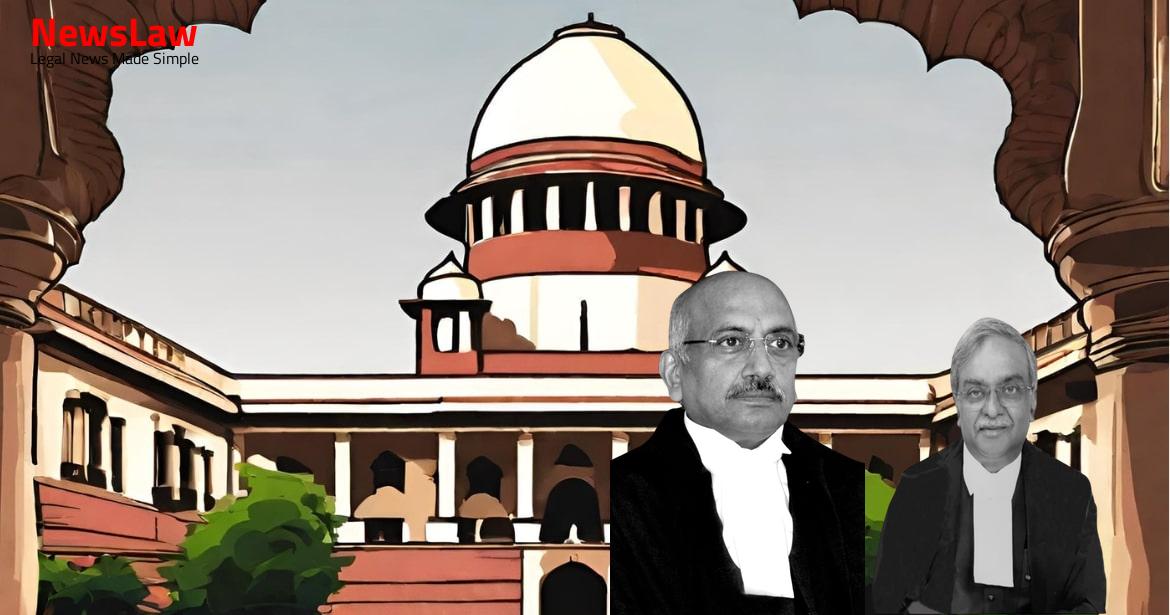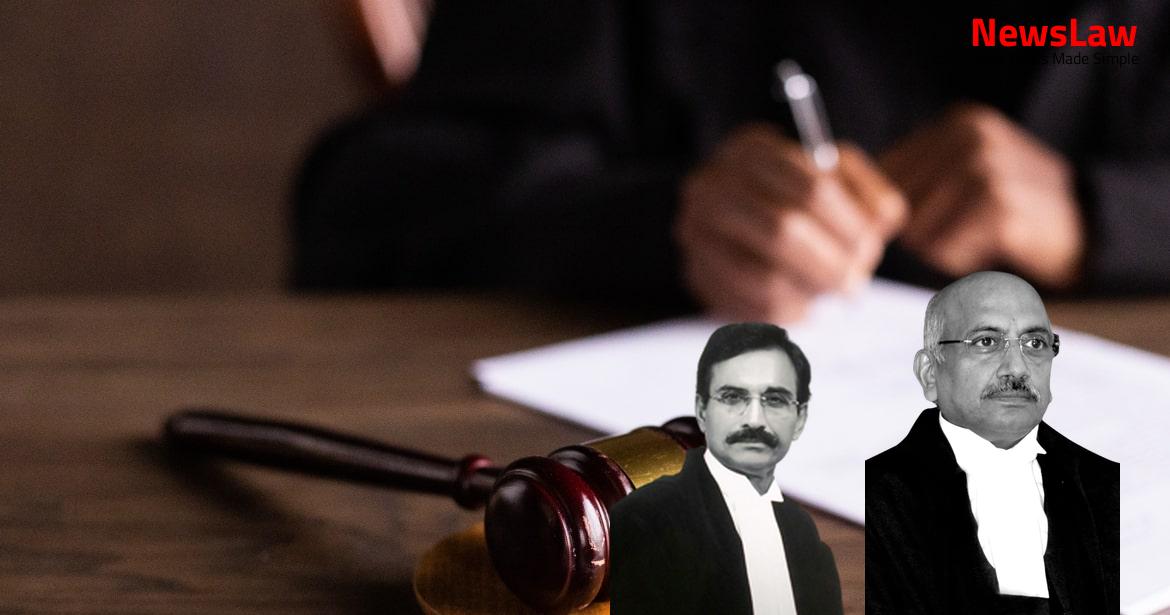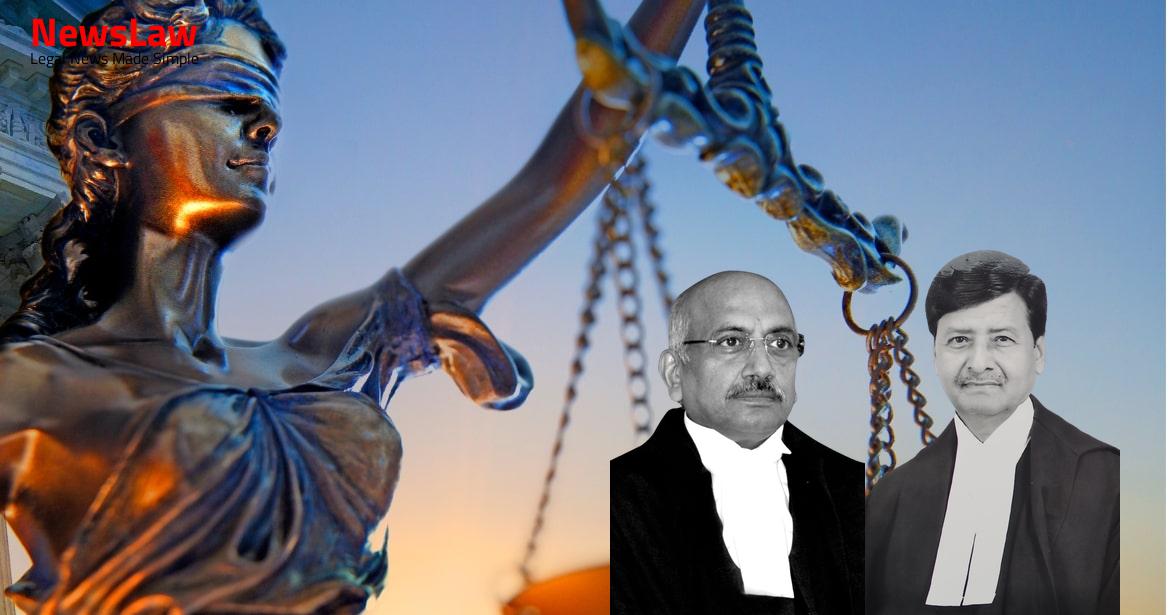In a recent legal case, the court delved into the admissibility of confession statements in joint trials under the TADA Act. The case highlighted the significance of adhering to the proper procedures for recording confessions, emphasizing the importance of voluntary and truthful statements. This blog post provides insights into the court’s legal analysis on the matter, shedding light on the complexities of handling confession evidence in criminal trials.
Facts
- The confession of the co-accused was not admissible in evidence against the present appellant.
- The accused Narendra Bahera, whose confessional statement had been relied upon, had been tried earlier and not jointly with the appellant and the co-accused person Baina Das.
- The appellant-accused is acquitted for the offence for which he was tried.
- The judgment and order dated 4.12.2009 passed by the Designated Court in Chennai convicting the appellant is set aside.
- Accused confessed under TADA Act on 02.09.1993, but confession was not recorded in a free atmosphere.
- Charges framed against accused under various sections including TADA Act and Explosive Substance Act.
- Accused, along with others, involved in conspiracy to blast a government building and create a bomb using electronic devices.
- Confession of accused recorded on 27.07.2007 by PW-28, following TADA Act procedures.
- Accused denied charges during questioning.
- Case evidence includes witness statements and examination under Section 313 of CrPC.
- Confession of accused relied upon for conviction, challenged by defense counsel for lack of adherence to guidelines.
Also Read: Ensuring Fairness: Court’s Discretion in Document Production
Arguments
- The appellant’s counsel argues that the confession (Ex. P-57) used as evidence against the appellant was not recorded in a free atmosphere, questioning its admissibility.
- Confession statements of co-accused (Ex. P-26 and P-27) are deemed inadmissible as there was no joint trial with the appellant, citing Section 30 of the Indian Evidence Act.
- The appellant’s lawyer cites the Kartar Singh case guidelines, alleging that the recording of the confession did not follow the laid out procedures.
- The Additional Advocate General contends that the appellant cannot misuse his own wrongful actions to undermine the purpose of Section 15 of the TADA Act.
- Referring to a specific case, it is argued that a confession made under Section 15 of the TADA Act is admissible against all tried jointly, emphasizing a self-contained scheme.
- The argument further questions the admissibility of the confession, claiming it was not voluntary and should not be the sole evidence for conviction without corroboration.
- The prescribed procedures under the TADA Act were not followed during the confession recording.
- The confession of the co-accused is viewed as not substantive evidence, particularly as the accused retracted the confession later.
- Learned Additional Advocate General appearing for the respondent-State supported the impugned judgment of the Designated Court.
- The confession of the co-accused (Ex. P-26 and P-27) is argued to be inadmissible in evidence due to lack of joint trial.
- It was emphasized that the confession of the co-accused is not a substantive piece of evidence.
Also Read: Legal Battle Over Elephant Corridors
Analysis
- Confessions recorded under Section 15 of the TADA Act are admissible against co-accused in joint trials.
- Confession statements must be voluntary and supported by proper warnings as per TADA Act and Rules.
- Confession recorded by police equated to one recorded by a Magistrate under Section 164 Cr.P.C., requiring proper safeguards.
- Corroboration may be required for confessions depending on the probative value in each case.
- Confession of co-accused in separate trials is not admissible against another accused.
- Proper transmission of confession statements to Designated Court is advisable to avoid doubts on genuineness.
- Confessions are considered highly reliable as they are made against the interest of the person.
- Guidelines have been issued to ensure confessions are obtained in a fair and voluntary manner.
- Confessions made to a police officer not lower than a Superintendent of Police can be used as evidence.
- Confessions under Section 15 of the TADA Act are substantive evidence, especially in joint trials.
- Confessions should be recorded in a free atmosphere and with full knowledge of the consequences.
- Confessions induced by hope, promise, force, or fear are not considered voluntary.
- Section 15 of the TADA Act provides a self-contained scheme for recording confessions.
- Section 15 of the TADA Act is a self-contained scheme for recording the confession of an accused charged with an offence under the said Act.
- The confession must be made voluntarily and recorded by an officer not below the rank of Superintendent of Police.
- Confession should be made in an atmosphere free from fear, duress, or hope of advantage induced by persons in authority.
- Confessions made to police officers are not admissible under the Evidence Act due to coercion and fear in police custody.
- Confessions recorded under Section 15(1) of the TADA Act are admissible as evidence, even against co-accused tried jointly.
- Confessions require no corroboration if recorded and deemed voluntary and truthful by the court.
- Confession of an accused tried previously would be rendered inadmissible.
- Confession of Narendra Behera was not admitted under Section 30 of the Evidence Act against the present appellant and the co-accused Baina Das.
- Confession statements of the other two accused persons (Ex.P-26 and P-27) are not admissible in evidence against the appellant.
- Designated Court was not justified in convicting the appellant.
- The appeal is allowed, and the judgment and order dated 4.12.2009 passed by the Presiding Judge, Designated Court No.2, Chennai, in Calendar Case No.1/2007 is set aside, acquitting the appellant-accused.
- Bail granted to the appellant on 25.09.2010 stands valid; hence, the question of releasing him does not arise, and the bail bond executed by the appellant and the surety, if any, stands cancelled.
Also Read: Ensuring Procedural Justice: Blacklisting in Government Tenders
Decision
- The appeal is allowed.
- The Court had granted bail to the appellant on 25.10.2010.
Case Title: RAJA @ AYYAPPAN Vs. STATE OF TAMIL NADU (2020 INSC 325)
Case Number: Crl.A. No.-001120-001120 / 2010



